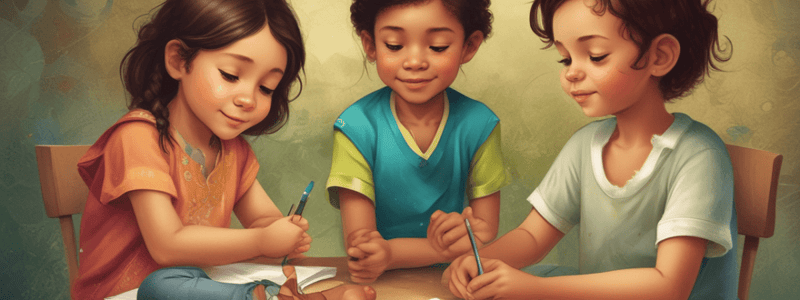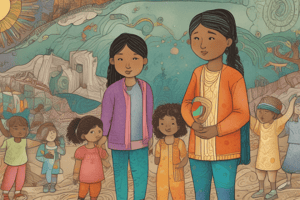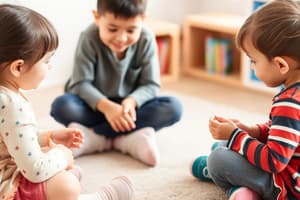Podcast
Questions and Answers
What is a key principle in relation to partnerships in the context of early childhood education?
What is a key principle in relation to partnerships in the context of early childhood education?
- Collaborative leadership and teamwork
- Secure, respectful and reciprocal relationships (correct)
- Equity and inclusion
- Respect for diversity
What is an important aspect of pedagogy in early childhood education?
What is an important aspect of pedagogy in early childhood education?
- Classroom management skills
- Knowledge of child development theories
- Understanding of curriculum frameworks
- Awareness of personal biases and values (correct)
What is a key practice in early childhood education?
What is a key practice in early childhood education?
- Technology-based learning
- Play-based learning and intentionality (correct)
- Project-based learning
- Theme-based learning
What is a key aspect of observing children in the planning cycle?
What is a key aspect of observing children in the planning cycle?
What is a key learning outcome for children in early childhood education?
What is a key learning outcome for children in early childhood education?
What is a key principle in relation to cultural responsiveness in early childhood education?
What is a key principle in relation to cultural responsiveness in early childhood education?
What is the primary focus of educators when observing children?
What is the primary focus of educators when observing children?
What is the purpose of educators' assessment of children's learning?
What is the purpose of educators' assessment of children's learning?
What is the role of NESA in education?
What is the role of NESA in education?
What is the outcome of educators' evaluation of their planning and implementation?
What is the outcome of educators' evaluation of their planning and implementation?
What is the benefit of educators' critical reflection on their practice?
What is the benefit of educators' critical reflection on their practice?
What is the primary focus of educators' planning and design?
What is the primary focus of educators' planning and design?
What is the responsibility of the NSW government across public, Catholic, and independent schools?
What is the responsibility of the NSW government across public, Catholic, and independent schools?
What is the main purpose of the Early Years Learning Framework (EYLF)?
What is the main purpose of the Early Years Learning Framework (EYLF)?
What are the goals outlined in the Melbourne Declaration on Educational Goals for Young Australians?
What are the goals outlined in the Melbourne Declaration on Educational Goals for Young Australians?
What is the impact of global integration and international mobility on young Australians?
What is the impact of global integration and international mobility on young Australians?
What is the focus of the Health and Physical Education syllabus in schools?
What is the focus of the Health and Physical Education syllabus in schools?
What is the approach of the PDHPE propositions in teaching students?
What is the approach of the PDHPE propositions in teaching students?
What is the purpose of the critical inquiry approach in the PDHPE propositions?
What is the purpose of the critical inquiry approach in the PDHPE propositions?
What is the focus of the health literacy aspect of the PDHPE propositions?
What is the focus of the health literacy aspect of the PDHPE propositions?
Flashcards are hidden until you start studying
Study Notes
Belonging, Being, and Becoming
Principles
- Secure, respectful, and reciprocal relationships (mqh qua lại) are essential.
- Partnerships, respect for diversity, and Aboriginal and Torres Strait Islander perspectives are valued.
- Equity, inclusion, and high expectations are promoted.
- Sustainability (sự bền vững), critical reflection, and ongoing professional learning are encouraged.
- Collaborative leadership and teamwork are fostered (khuyến khích).
Practices
- Holistic, integrated (phối hợp), and interconnected (mối liên hệ) approaches are used.
- Responsiveness to children, play-based learning, and intentionality (chú ý) are emphasised.
- Learning environments, cultural responsiveness (phản ứng văn hoá), and continuity of learning and transitions are considered.
- Assessment and evaluation (đánh giá) for learning, development, and wellbeing are prioritised.
Learning Outcomes
- Children develop a strong sense of identity.
- Children are connected with and contribute (đóng góp) to their world.
- Children have a strong sense of wellbeing.
- Children are confident and involved learners.
- Children are effective communicators (người giao tiếp hiệu quả).
Early Childhood Pedagogy
- Pedagogy involves professional knowledge and skills.
- Contextual knowledge of each child, their families, and communities is essential.
- Relationships with children and families are critical to creating safe and trusting spaces.
- Awareness of personal beliefs and values and their impact on children's learning and wellbeing is necessary.
The Planning Cycle
Observe (quan Sát)
- Educators use multiple sources of information to gather and document children's learning (tài liệu học tập), development, and wellbeing.
- Observation, listening, and engagement with children are crucial.
Assess(evaluate)
- Educators draw on a range of sources and professional knowledge to identify children's strengths and capacities (khả năng).
- Assessment considers children's awareness and understanding of their own learning.
Plan
- Educators plan how to consolidate (củng cố), enrich, and extend children's learning and thinking.
- Relational and place-based pedagogies are core to planning meaningful learning experiences.
Implement (thực hiện)
- Educators enact (make law) and review planned learning experiences for individuals and groups of children.
- Intentionality(cố ý) and engagement amplify (mở rộng) children's learning.
Evaluate
- Educators critically reflect on the implementation of plans and consider the effectiveness of learning experiences.
- Evaluation informs (notify) future planning and professional learning.
ACARA, BOSTES, and NESA
- ACARA is responsible for the national curriculum, assessment, and reporting.
- BOSTES was replaced by NESA, which is responsible for setting and monitoring (kiểm tra) quality teaching, learning, assessment, and school standards in NSW.
Connecting the EYLF and NSW K-10 PDHPE Syllabus
- The EYLF provides a foundation (thiết lập) for future success in learning.
- The Melbourne Declaration on Educational Goals for Young Australians identifies key goals for education.
Melbourne Declaration on Educational Goals for Young Australians
- The declaration outlines two goals:
- Australian schooling promotes equity and excellence.
- All young Australians become successful learners, confident and creative individuals, and active and informed citizens (công dân hiểu biết).
Aims of Health and Physical Education
- Promote children's health, wellbeing, safety, and participation in physical activity.
- Develop knowledge, understanding, and skills for a healthy and active life.
- Ensure students can work effectively, access and evaluate information, and make decisions to protect or enhance their health.
PDHPE Propositions
- Educators provide knowledge and help students understand help-seeking behaviors.
- A critical inquiry approach is used to teach students to find and evaluate information.
- Students apply knowledge to themselves and value movement and its health benefits.
Studying That Suits You
Use AI to generate personalized quizzes and flashcards to suit your learning preferences.




